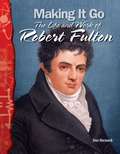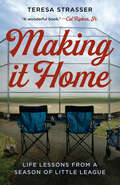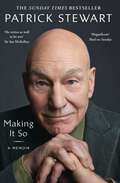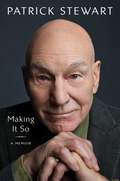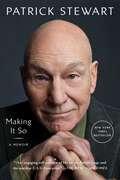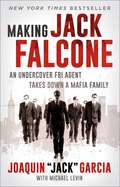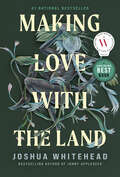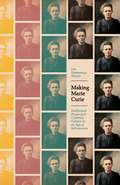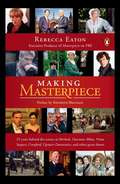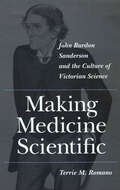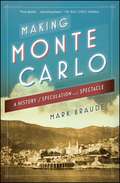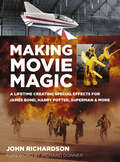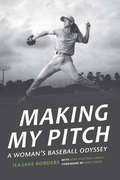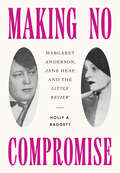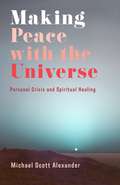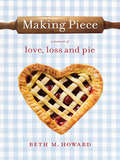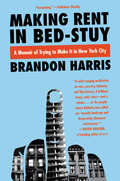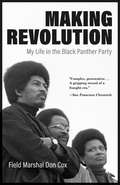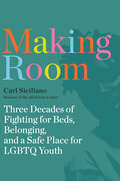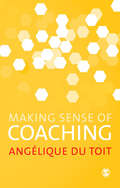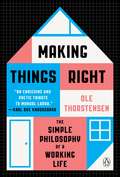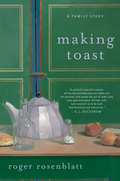- Table View
- List View
Making It Go: The Life And Work Of Robert Fulton
by Don HerweckRobert Fulton is best known for inventing the first successful steamboat, but that is just one of his many accomplishments. Fulton was an inventor, artist, statesman, mechanic, and engineer who used his artistic skills to sketch his inventions, which he also built. He even designed what would become the submarine.
Making It Home: Life Lessons from a Season of Little League
by Teresa StrasserAn achingly heartfelt and surprisingly funny memoir about family, grief, and moving forward by an award-winning writer and TV personality. When her brother dies from cancer, and then her mother just four months later, Teresa Strasser has no one to mourn with but her irresponsible, cantankerous, trailerpark-dwelling father. He claims not to remember her chaotic childhood, but he&’s a devoted grandpa, so as her son embarks on his first season pitching in Little League, Teresa and Nelson form a grief group of two in beach chairs lined up behind the first base line. There are no therapeutically trained facilitators and no rules other than those dictated by the Little League of America, and the human heart. For Teresa and her father, the stages of grief are the draft, the regular season, and the playoffs. One season of baseball becomes the framework for a memoir about family, loss, and the fundamentals of baseball and life. They cheer, talk smack about other teams, scream at each other in the parking lot, and care way too much about Little League. Making It Home is a bracingly honest journey through grief, self-doubt, and anxiety armed with humor and optimism. After all, America&’s pastime may be just a game, but it always leaves room for redemption, even at the bottom of the lineup.
Making It So: A Memoir
by Patrick StewartThe long-awaited memoir from iconic, beloved actor and living legend Sir Patrick Stewart! From his acclaimed stage triumphs to his legendary onscreen work in the Star Trek and X-Men franchises, Sir Patrick Stewart has captivated audiences around the world and across multiple generations with his indelible command of stage and screen. Now, he presents his long-awaited memoir, MAKING IT SO, a revealing portrait of an artist whose astonishing life—from his humble beginnings in Yorkshire, England to the heights of Hollywood and worldwide acclaim—proves a story as exuberant, definitive, and enduring as the author himself.
Making It So: A Memoir
by Patrick StewartThe long-awaited memoir from iconic, beloved actor and living legend Sir Patrick Stewart! From his acclaimed stage triumphs to his legendary onscreen work in the Star Trek and X-Men franchises, Sir Patrick Stewart has captivated audiences around the world and across multiple generations with his indelible command of stage and screen. Now, he presents his long-awaited memoir, Making It So, a revealing portrait of an artist whose astonishing life—from his humble beginnings in Yorkshire, England, to the heights of Hollywood and worldwide acclaim—proves a story as exuberant, definitive, and enduring as the author himself.
Making It So: A Memoir
by Patrick StewartTHE NEW YORK TIMES AND USA TODAY BESTSELLER The renowned and bestselling memoir—written with &“insight, truth, and passion&” (Sir Ian McKellen)—from iconic, beloved actor and living legend Sir Patrick Stewart.From his acclaimed stage triumphs to his legendary onscreen work, Sir Patrick Stewart has captivated audiences around the world and across multiple generations in a career spanning six decades with his indelible command of stage and screen. No other British working actor enjoys such career variety, universal respect, and unending popularity, as witnessed through his seminal roles—whether as Captain Jean-Luc Picard of Star Trek fame, Professor Charles Xavier of Marvel's X-Men hit movie franchise, his more than forty years as part of the Royal Shakespeare Company, his unforgettable one-man show adapted from Charles Dickens&’s A Christmas Carol, or his comedic work in American Dad!, Ted, Extras, and Blunt Talk, among many others. Now, he presents his stunning memoir, a revealing portrait of a driven artist whose astonishing life—from his humble beginnings in Yorkshire, England, to the heights of Hollywood and worldwide acclaim—proves a story as exuberant, definitive, and enduring as the author himself.
Making Jack Falcone: An Undercover FBI Agent Takes Down a Mafia Family
by Joaquin "Jack" Garcia"Petey Chops wasn't kicking up. And if he didn't start soon, he was going to get whacked." So begins Making Jack Falcone, the extraordinary true story of an undercover FBI agent's years-long investigation of the Gambinos, which resulted in a string of arrests that crippled the organized crime family. But long before Joaquin "Jack" Garcia found himself wearing a wire with some of the Mafia's top capos, he was one of the FBI's unlikeliest recruits. A Cuban-born American, Jack graduated from Quantico standing six-foot-four and weighing 300 pounds -- not your typical G-man. Jack's stature soon proved an asset as the FBI looked to place agents undercover with drug smugglers, counterfeiters, and even killers. Jack became one of the few FBI agents dedicated solely to undercover work. Using a series of carefully created aliases, Jack insinuated himself in the criminal world, from the Badlands of Philadelphia, where he was a gregarious money launderer, to the streets of Miami, where an undercover Garcia moved stolen and illicit goods and brought down dirty cops. Jack jumped at the opportunity to infiltrate the shadowy world of La Cosa Nostra, but how would the Cuban-American convince wiseguys that he was one of their own, a Sicilian capable of "earning his button" -- getting made in the Mafia? For the first time, the FBI created a special "mob school" for Jack, teaching him how to eat, talk, and think like a wiseguy. And it wasn't long before the freshly minted Jack Falcone found himself under the wing of one of the Gambinos' old school capos, Greg DePalma. DePalma, who cared for an ailing John Gotti in prison, introduced Falcone to his world of shakedowns, beatings, and envelopes of cash, never suspecting that one of his trusted crew members was a federal agent. A page-turning account of the struggle between law enforcement and organized crime that will rank with such classic stories as Donnie Brasco, Serpico, and Wiseguy, Making Jack Falcone is an unforgettable trip into America's underworld through the eyes of a highly decorated FBI veteran.
Making Love with the Land: Essays
by Joshua Whitehead#1 NATIONAL BESTSELLERFINALIST FOR THE HILARY WESTON WRITERS' TRUST PRIZE FOR NONFICTIONMuch-anticipated non-fiction from the author of the Giller-longlisted, GG-shortlisted and Canada Reads-winning novel Jonny Appleseed.&“Thrillingly cerebral. . . . Delivered with virtuoso aplomb.&” —The New York TimesIn the last few years, following the publication of his debut novel Jonny Appleseed, Joshua Whitehead has emerged as one of the most exciting and important new voices on Turtle Island. Now, in this first non-fiction work, Whitehead brilliantly explores Indigeneity, queerness, and the relationships between body, language and land through a variety of genres (essay, memoir, notes, confession). Making Love with the Land is a startling, heartwrenching look at what it means to live as a queer Indigenous person "in the rupture" between identities. In sharp, surprising, unique pieces—a number of which have already won awards—Whitehead illuminates this particular moment, in which both Indigenous and non-Indigenous peoples are navigating new (and old) ideas about "the land." He asks: What is our relationship and responsibility towards it? And how has the land shaped our ideas, our histories, our very bodies?Here is an intellectually thrilling, emotionally captivating love song—a powerful revelation about the library of stories land and body hold together, waiting to be unearthed and summoned into word.
Making Marie Curie: Intellectual Property and Celebrity Culture in an Age of Information
by Eva Hemmungs WirténIn many ways, Marie Curie represents modern science. Her considerable lifetime achievements--the first woman to be awarded a Nobel Prize, the only woman to be awarded the Prize in two fields, and the only person to be awarded Nobel Prizes in multiple sciences--are studied by schoolchildren across the world. When, in 2009, the New Scientist carried out a poll for the "Most Inspirational Female Scientist of All Time," the result was a foregone conclusion: Marie Curie trounced her closest runner-up, Rosalind Franklin, winning double the number of Franklin's votes. She is a role model to women embarking on a career in science, the pride of two nations--Poland and France--and, not least of all, a European Union brand for excellence in science. Making Marie Curie explores what went into the creation of this icon of science. It is not a traditional biography, or one that attempts to uncover the "real" Marie Curie. Rather, Eva Hemmungs Wirtén, by tracing a career that spans two centuries and a world war, provides an innovative and historically grounded account of how modern science emerges in tandem with celebrity culture under the influence of intellectual property in a dawning age of information. She explores the emergence of the Curie persona, the information culture of the period that shaped its development, and the strategies Curie used to manage and exploit her intellectual property. How did one create and maintain for oneself the persona of scientist at the beginning of the twentieth century? What special conditions bore upon scientific women, and on married women in particular? How was French identity claimed, established, and subverted? How, and with what consequences, was a scientific reputation secured? In its exploration of these questions and many more, Making Marie Curie provides a composite picture not only of the making of Marie Curie, but the making of modern science itself.
Making Masterpiece
by Rebecca Eaton Kenneth Branagh"[An] anecdote-filled memoir . . . Rebecca Eaton looks back on 25 fascinating years at Masterpiece Theatre and Mystery!" --USA TodayWhen Rebecca Eaton became the producer of Masterpiece Theatre in 1985, she hadn't actually seen many of the episodes. Nor did she even like mystery novels, though she would be required to choose stories for Mystery! But the lifelong Anglophile seized her chance to make a mark in the budding public television system. Twenty-eight years later, Masterpiece is one of television's hottest shows, and Eaton is responsible for its triumphant transition from the "quill-pen" era into the digital age.Filled with anecdotes about (and the occasional interview with) the unforgettable hosts, the inspired creators, and the many talented actors she's worked with over the years, Making Masterpiece is a compulsively readable treat for any fan of these beloved and iconic programs. s stories about actors and other luminaries such as Alistair Cooke, Maggie Smith, Diana Rigg, Benedict Cumberbatch and Daniel Radcliffe, whose first TV role was as the title character in David Copperfield.Readers will also get to know Eaton on a personal level. With a childhood steeped in theater, an affinity for nineteenth century novels and culture, and an "accidental apprenticeship" with the BBC, Eaton was practically born to lead the Masterpiece and Mystery! franchises. Making Masterpiece marks the first time the driving force behind the enduring flagship show reveals all.
Making Masterpiece
by Rebecca Eaton Kenneth BranaghThe Emmy Award-winning producer of PBS's Masterpiece Theatre and Mystery! reveals the secrets to Downton Abbey, Sherlock, and its other hit programsFor more than twenty-five years and counting, Rebecca Eaton has presided over PBS's Masterpiece Theatre, the longest running weekly prime time drama series in American history. From the runaway hitsUpstairs, Downstairs and The Buccaneers, to the hugely popular Inspector Morse, Prime Suspect, and Poirot, Masterpiece Theatre and its sibling series Mystery! have been required viewing for fans of quality drama.Eaton interviews many of the writers, directors, producers, and other contributors and shares personal anecdotes--including photos taken with her own camera--about her decades-spanning career. She reveals what went on behind the scenes during such triumphs as Cranford and the multiple, highly-rated programs made from Jane Austen's novels, as well as her aggressive campaign to attract younger viewers via social media and online streaming. Along the way she shares stories about actors and other luminaries such as Alistair Cooke, Maggie Smith, Diana Rigg, Benedict Cumberbatch and Daniel Radcliffe, whose first TV role was as the title character in David Copperfield.Readers will also get to know Eaton on a personal level. With a childhood steeped in theater, an affinity for nineteenth century novels and culture, and an "accidental apprenticeship" with the BBC, Eaton was practically born to lead the Masterpiece and Mystery! franchises. Making Masterpiece marks the first time the driving force behind the enduring flagship show reveals all.
Making Medicine Scientific: John Burdon Sanderson and the Culture of Victorian Science
by Terrie M. RomanoIn Victorian Britain scientific medicine encompassed an array of activities, from laboratory research and the use of medical technologies through the implementation of sanitary measures that drained canals and prevented the adulteration of milk and bread. Although most practitioners supported scientific medicine, controversies arose over where decisions should be made, in the laboratory or in the clinic, and by whom—medical practitioners or research scientists. In this study, Terrie Romano uses the life and eclectic career of Sir John Burdon Sanderson (1829-1905) to explore the Victorian campaign to make medicine scientific.Sanderson, in many ways a prototypical Victorian, began his professional work as a medical practitioner and Medical Officer of Health in London, then became a pathologist and physiologist and eventually the Regius Professor of Medicine at Oxford. His career illustrates the widespread support during this era for a medicine based on science. In Making Medicine Scientific, Romano argues this support was fueled by the optimism characteristic of the Victorian age, when the application of scientific methods to a range of social problems was expected to achieve progress. Dirt and disease as well as the material culture of experimentation —from frogs to photographs—represent the tangible context in which Sanderson lived and worked. Romano's detailed portrayal reveals a fascinating figure who embodied the untidy nature of the Victorian age's shift from an intellectual system rooted in religion to one based on science.
Making Medicine Scientific: John Burdon Sanderson and the Culture of Victorian Science
by Terrie M. RomanoA biography of the English physician and scientist and a history of the advancement of science in the Victorian era.In Victorian Britain, scientific medicine encompassed an array of activities, from laboratory research and the use of medical technologies through the implementation of sanitary measures that drained canals and prevented the adulteration of milk and bread. Although most practitioners supported scientific medicine, controversies arose over where decisions should be made, in the laboratory or in the clinic, and by whom—medical practitioners or research scientists. In this study, Terrie Romano uses the life and eclectic career of Sir John Burdon Sanderson (1829-1905) to explore the Victorian campaign to make medicine scientific.Sanderson, a prototypical Victorian, began his professional work as a medical practitioner and Medical Officer of Health in London, then became a pathologist and physiologist and eventually the Regius Professor of Medicine at Oxford. His career illustrates the widespread support during this era for a medicine based on science. In Making Medicine Scientific, Romano argues this support was fueled by the optimism characteristic of the Victorian age, when the application of scientific methods to a range of social problems was expected to achieve progress. Dirt and disease as well as the material culture of experimentation —from frogs to photographs—represent the tangible context in which Sanderson lived and worked. Romano’s detailed portrayal reveals a fascinating figure who embodied the untidy nature of the Victorian age’s shift from an intellectual system rooted in religion to one based on science.“A useful entry in the canon of science and public health . . . an antidote to the hubris of recent claims of accomplishment.” —Choice
Making Monte Carlo: A History of Speculation and Spectacle
by Mark BraudeA rollicking narrative history of Monte Carlo, capturing its nineteenth-century rise as the world's first modern casino-resort and its Jazz Age heyday as infamous playground of the rich.Monte Carlo has long been known as a dazzling playground for the rich and famous. Less well known are the shrewd and often ruthless strategies that went into creating such a potent symbol of luxury and cosmopolitan glamour. As historian Mark Braude reveals in his entertaining and informative Making Monte Carlo, the world's first modern casino-resort started as an unlikely prospect--with the legalization of gambling in tiny Monaco in 1855--and eventually emerged as the most glamorous gambling destination of the Victorian era. The resort declined in the wake of WWI, and was reinvented, again, to suit the styles and desires of the new Jazz Age tastemakers, such as F. Scott and Zelda Fitzgerald, Gerald and Sarah Murphy, and Coco Chanel. Along the way, we encounter a colorful cast of characters, including the fast-talking Francois Blanc (a professional gambler, stock market manipulator, and founder of Monte Carlo); Basil Zaharoff (notorious munitions dealer and possible secret owner of the casino in the 1920s); Elsa Maxwell (a brash society figure and Hollywood maven, hired as the casino's publicist); Réné Léon (a visionary Jewish businessman, who revitalized the resort after WWI); Jean Cocteau, Pablo Picasso, and other satellite members of Serge Diaghilev's Ballet Russes dance company; as well as Cole Porter, Ernest Hemingway and other American expats who 'colonized' the Riviera in the 1920s. A rollercoaster history of how a small, rural town grew into the prosperous resort epicenter of the late nineteenth century and rose again to greatness out of the ashes of WWI, Making Monte Carlo is a classic rags-to-riches tale set in the most scenic of European settings.
Making Movie Magic: A Lifetime Creating Special Effects for James Bond, Harry Potter, Superman and More
by John Richardson Richard Donner‘It made for an easy read and a lot of chuckling. If you didn’t have respect for physical special effects in films before, you will now.’ G. F. Willmetts, SFcrowsnest‘the perfect blend of autobiography and behind-the-scenes storytelling. Making Movie Magic is a magic movie-making book.’ Brian James Smith, From Sweden With Love?JOHN RICHARDSON is an Oscar-winning special effects supervisor and designer, who has been involved in over 100 movies, including nine James Bond adventures, all eight Harry Potter films, Aliens, Superman, A Bridge Too Far, Straw Dogs, The Omen, Cliffhanger, Far and Away, Willow . . . and many, many more. In creating the magic that flows through these films – by creating huge explosions, beheading people, producing futuristic gadgets, making a man fly or breathing life into creatures that amaze and haunt us – Richardson has come to hold a unique place in cinema history.The son of pioneering FX technician Cliff Richardson, he learned his trade at the feet of a master of the craft. With over five decades of adventures under his belt, and a vast photographic collection of unseen pictures, Richardson now lifts the lid on his exciting and fascinating career of making movie magic.
Making My Pitch: A Woman's Baseball Odyssey
by Ila Jane Borders Jean Hastings Ardell Mike VeeckMaking My Pitch tells the story of Ila Jane Borders, who despite formidable obstacles became a Little League prodigy, MVP of her otherwise all-male middle school and high school teams, the first woman awarded a baseball scholarship, and the first to pitch and win a complete men’s collegiate game. After Mike Veeck signed Borders in May 1997 to pitch for his St. Paul Saints of the independent Northern League, she accomplished what no woman had done since the Negro Leagues era: play men’s professional baseball. Borders played four professional seasons and in 1998 became the first woman in the modern era to win a professional ball game. Borders had to find ways to fit in with her teammates, reassure their wives and girlfriends, work with the media, and fend off groupies. But these weren’t the toughest challenges. She had a troubled family life, a difficult adolescence as she struggled with her sexual orientation, and an emotionally fraught college experience as a closeted gay athlete at a Christian university. Making My Pitch shows what it’s like to be the only woman on the team bus, in the clubhouse, and on the field. Raw, open, and funny at times, her story encompasses the loneliness of a groundbreaking pioneer who experienced grave personal loss. Borders ultimately relates how she achieved self-acceptance and created a life as a firefighter and paramedic and as a coach and goodwill ambassador for the game of baseball.
Making No Compromise: Margaret Anderson, Jane Heap, and the "Little Review"
by Holly A. BaggettMaking No Compromise is the first book-length account of the lives and editorial careers of Margaret Anderson and Jane Heap, the women who founded the avant-garde journal the Little Review in Chicago in 1914. Born in the nineteenth-century Midwest, Anderson and Heap grew up to be iconoclastic rebels, living openly as lesbians, and advocating causes from anarchy to feminism and free love. Their lives and work shattered cultural, social, and sexual norms. As their paths crisscrossed Chicago, New York, Paris, and Europe; two World Wars; and a parade of the most celebrated artists of their time, they transformed themselves and their journal into major forces for shifting perspectives on literature and art. Imagism, Dada, surrealism, and Machine Age aesthetics were among the radical trends the Little Review promoted and introduced to US audiences. Anderson and Heap published the early work of the "men of 1914"—Ezra Pound, James Joyce, William Butler Yeats, and T. S. Eliot—and promoted women writers such as Djuna Barnes, May Sinclair, Dorothy Richardson, Mina Loy, Mary Butts, and the inimitable Baroness Elsa von Freytag-Loringhoven. In the mid-1920s Anderson and Heap became adherents of George I. Gurdjieff, a Russian mystic, and in 1929 ceased publication of the Little Review.Holly A. Baggett examines the roles of radical politics, sexuality, modernism, and spirituality and suggests that Anderson and Heap's interest in esoteric questions was evident from the early days of the Little Review. Making No Compromise tells the story of two women who played an important role in shaping modernism.
Making Peace with the Universe: Personal Crisis and Spiritual Healing
by Michael Scott AlexanderThe world’s great religious and philosophical traditions often include poignant testimonies of spiritual turmoil and healing. Following episodes of harrowing personal crisis, including addictions, periods of anxiety and panic, and reminders of mortality, these accounts then also describe pathways to consolation and resolution.In Making Peace with the Universe, Michael Scott Alexander reads diverse classic religious accounts as masterpieces of therapeutic insight. In the company of William James, Socrates, Muslim legal scholar turned mystic Hamid al-Ghazali, Chinggis Khan as described by the Daoist monk Qui Chuji, and jazz musician and Catholic convert Mary Lou Williams, Alexander traces the steps from existential crisis to psychological health. He recasts spiritual confessions as case histories of therapy, showing how they remain radical and deeply meaningful even in an age of scientific psychology. They record the therapeutic affect of spiritual experience, testifying to the achievement of psychological well-being through the cultivation of an edifying spiritual mood.Mixing scholarly learning with episodes from his own skeptical quest, Alexander demonstrates how these accounts of private terror and personal triumph offer a model of therapy through spiritual adventure. An interdisciplinary consideration of the shared terrain of religion and psychology, Making Peace with the Universe offers an innovative view of what spiritual traditions can teach us about finding meaning in the modern world.
Making Piece
by Beth M. Howard"You will find my story is a lot like pie, a strawberry-rhubarb pie. It's bitter. It's messy. It's got some sweetness, too. Sometimes the ingredients get added in the wrong order, but it has substance, it will warm your insides, and even though it isn't perfect, it still turns out okay in the end."When journalist Beth M. Howard's young husband dies suddenly, she packs up the RV he left behind and hits the American highways. At every stop along the way-whether filming a documentary or handing out free slices on the streets of Los Angeles-Beth uses pie as a way to find purpose. Howard eventually returns to her Iowa roots and creates the perfect synergy between two of America's greatest icons-pie and the American Gothic House, the little farmhouse immortalized in Grant Wood's famous painting, where she now lives and runs the Pitchfork Pie Stand.Making Piece powerfully shows how one courageous woman triumphs over tragedy. This beautifully written memoir is, ultimately, about hope. It's about the journey of healing and recovery, of facing fears, finding meaning in life again, and moving forward with purpose and, eventually, joy. It's about the nourishment of the heart and soul that comes from the simple act of giving to others, like baking a homemade pie and sharing it with someone whose pain is even greater than your own. And it tells of the role of fate, second chances and the strength found in community.
Making Rent in Bed-Stuy: A Memoir of Trying to Get By in New York City
by Brandon HarrisA young African American millennial filmmaker’s funny, sometimes painful, true-life coming-of-age story of trying to make it in New York City—a chronicle of poverty and wealth, creativity and commerce, struggle and insecurity, and the economic and cultural forces intertwined with "the serious, life-threatening process" of gentrification.Making Rent in Bed-Stuy explores the history and sociocultural importance of Bedford-Stuyvesant, Brooklyn’s largest historically black community, through the lens of a coming-of-age young American negro artist living at the dawn of an era in which urban class warfare is politely referred to as gentrification. Bookended by accounts of two different breakups, from a roommate and a lover, both who come from the white American elite, the book oscillates between chapters of urban bildungsroman and a historical examination of some of Bed-Stuy’s most salient aesthetic and political legacies.Filled with personal stories and a vibrant cast of iconoclastic characters— friends and acquaintances such as Spike Lee; Lena Dunham; and Paul MacCleod, who made a living charging $5 for a tour of his extensive Elvis collection—Making Rent in Bed-Stuy poignantly captures what happens when youthful idealism clashes head-on with adult reality.Melding in-depth reportage and personal narrative that investigates the disappointments and ironies of the Obama era, the book describes Brandon Harris’s radicalization, and the things he lost, and gained, along the way.
Making Revolution: My Life in the Black Panther Party
by Field Marshal Don CoxMaking Revolution is Don Cox’s revelatory, even incendiary account of his years in the Black Panther Party. He had participated in many peaceful Bay Area civil rights protests but hungered for more militant action. His book tells the story of his work as the party’s field marshal in charge of gunrunning to planning armed attacks—tales which are told for the first time in this remarkable memoir—to his star turn raising money at the Manhattan home of Leonard Bernstein (for which he was famously mocked by Tom Wolfe in Radical Chic and Mau-Mauing the Flak Catchers), to his subsequent flight to Algeria to join Eldridge Cleaver in exile, to his decision to leave the party following his disillusionment with Huey P. Newton’s leadership. Cox would live out the rest of his life in France, where he wrote these unrepentant recollections in the early 1980s, enjoining his daughter to promise him that she would do everything she could to have them published.
Making Room: Three Decades of Fighting for Beds, Belonging, and a Safe Place for LGBTQ Youth
by Carl SicilianoFrom a pioneering advocate for LGBTQ youth, a gripping, impassioned account of how an unhoused queer youth's murder compelled him to create the nation's largest housing program for homeless LGBTQ teens. &“A gut-wrenchingly poignant real-life saga . . . an unputdownable account of what it looks like when compassion is harnessed to funding and policy.&”—Tim Murphy, author of Christodora and Speech Team What power does a long-disenfranchised community hold to transform the treatment of its most abused members? How can we locate that power? Carl Siciliano met Ali Forney—a Black nonbinary teenager known for fierce loyalty to friends and an unshakeable faith that &“my God will love me for who I am&”—in 1994 while working at a daytime center for homeless youth in New York City. Nineteen years old, Forney was one of thousands Siciliano encountered who had been driven from their homes by rejecting families, forced to struggle in the streets due to homophobic and transphobic violence in the shelters. Then Forney was murdered, a moment of horror and devastation that exposed the brutality that teenagers like Forney faced in a city marked by gentrification, racist policing, and the onslaught of the AIDS epidemic. Anguished by Forney&’s loss, Siciliano fought to create homes where unhoused queer teens could live safely, with their human dignity at last affirmed, while he helped lead a movement that compelled New York City to invest millions of dollars in kids who&’d been ignored for decades. Siciliano writes with loving affection for Forney and many other queer teens, showing deep respect for their wisdom, courage, and spiritual integrity. Their stories illuminate the harsh realities faced by hundreds of thousands of LGBTQ youths suffering from homelessness across our nation. And, exposing the political and religious forces that continue to endanger LGBTQ youths, he makes a clarion call for their protection. Written with heart and profound insight, Making Room is a landmark personal narrative, bringing to life an untold chapter of LGBTQ history and testifying to the power of community, solidarity, and the human spirit.
Making Sense of Coaching
by Angelique Du ToitIn her latest book, Angélique du Toit goes beyond the techniques and goals explored in most coaching texts to examine the process of coaching and the importance of sense-making for creating meaning and encouraging self-reflection. In doing this, the coaching experience emerges as a type of transformational learning, in which the individual is guided through a journey of discovery and revelation. Theories are drawn together in a fresh and original way which will cause readers to question how coaching should be defined and practised. <P><P> Dr Angélique du Toit is an academic practitioner and is involved in the delivery of academic programmes and publications related to coaching. She is also an Executive Coach supporting senior executives in their personal development in both the public and private sectors.
Making Thatcher's Britain
by Ben Jackson Robert SaundersMargaret Thatcher was one of the most controversial figures of modern times. Her governments inspired hatred and veneration in equal measure and her legacy remains fiercely contested. Yet assessments of the Thatcher era are often divorced from any larger historical perspective. This book draws together leading historians to locate Thatcher and Thatcherism within the political, social, cultural and economic history of modern Britain. It explores the social and economic crises of the 1970s; Britain's relationships with Europe, the Commonwealth and the United States; and the different experiences of Thatcherism in Scotland, Wales and Northern Ireland. The book assesses the impact of the Thatcher era on class and gender and situates Thatcherism within the Cold War, the end of Empire and the rise of an Anglo-American 'New Right'. Drawing on the latest available sources, it opens a wide-ranging debate about the Thatcher era and its place in modern British history.
Making Things Right: The Simple Philosophy of a Working Life
by Ole ThorstensenA celebration of craftsmanship, teamwork, and the relationship between contractor and client. "An enriching and poetic tribute to manual labour."—Karl Ove Knausgaard Making Things Right is the simple yet captivating story of a loft renovation, from the moment master carpenter and contractor Ole Thorstensen submits an estimate for the job to when the space is ready for occupation. As the project unfolds, we see the construction through Ole’s eyes: the meticulous detail, the pesky splinters, the problem solving, patience, and teamwork required for its completion. Yet Ole’s narrative encompasses more than just the fine mechanics of his craft. His labor and passion drive him toward deeper reflections on the nature of work, the academy versus the trades, identity, and life itself. Rich with descriptions of carpentry and process, Making Things Right is a warm and humorous portrayal of a tightknit working community, a story about the blood, sweat, and frustration involved in doing a job well and the joys in seeing a vision take shape.
Making Toast
by Roger Rosenblatt"How long are you staying, Boppo?""Forever."When his daughter, Amy--a gifted doctor, mother, and wife--collapses and dies from an asymptomatic heart condition, Roger Rosenblatt and his wife, Ginny, leave their home on the South Shore of Long Island to move in with their son-in-law, Harris, and their three young grandchildren: six-year-old Jessica, four-year-old Sammy, and one-year-old James, known as Bubbies. Long past the years of diapers, homework, and recitals, Roger and Ginny--Boppo and Mimi to the kids--quickly reaccustom themselves to the world of small children: bedtime stories, talking toys, playdates, nonstop questions, and nonsequential thought. Though reeling from Amy's death they carry on, reconstructing a family, sustaining one another, and guiding three lively, alert, and tender-hearted children through the pains and confusions of grief. As he marvels at the strength of his son-in-law, a surgeon, and the tenacity and skill of his wife, a former kindergarten teacher, Roger attends each day to "the one household duty I have mastered"--preparing the morning toast perfectly to each child's liking. With the wit, heart, precision, and depth of understanding that has characterized his work, Roger Rosenblatt peels back the layers on this most personal of losses to create both a tribute to his late daughter and a testament to familial love. The day Amy died, Harris told Ginny and Roger, "It's impossible." Roger's story tells how a family makes the possible of the impossible.
